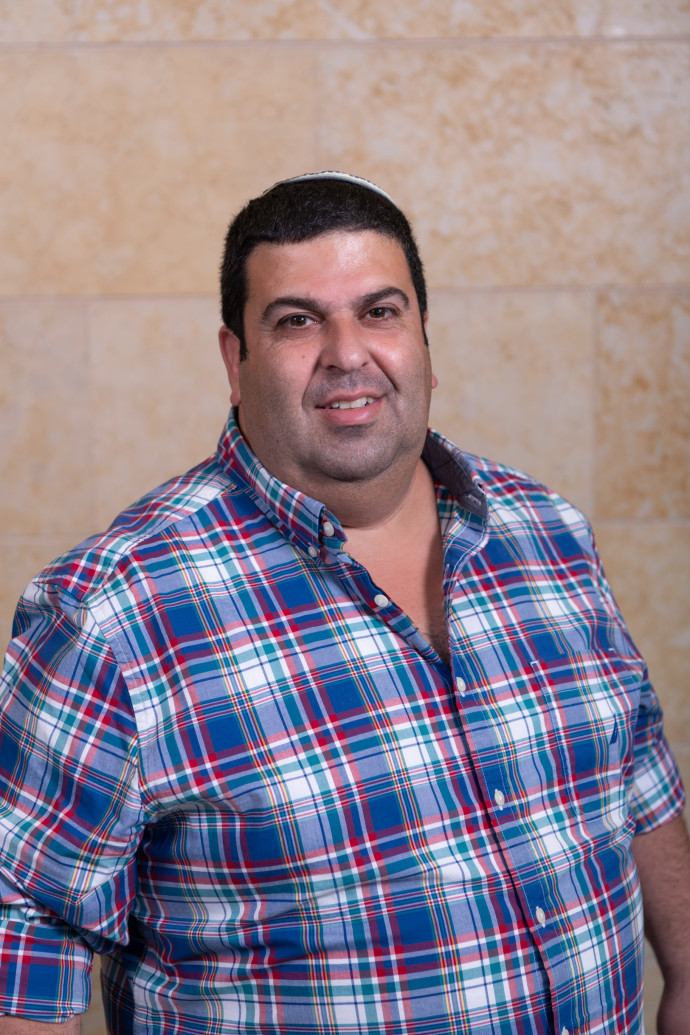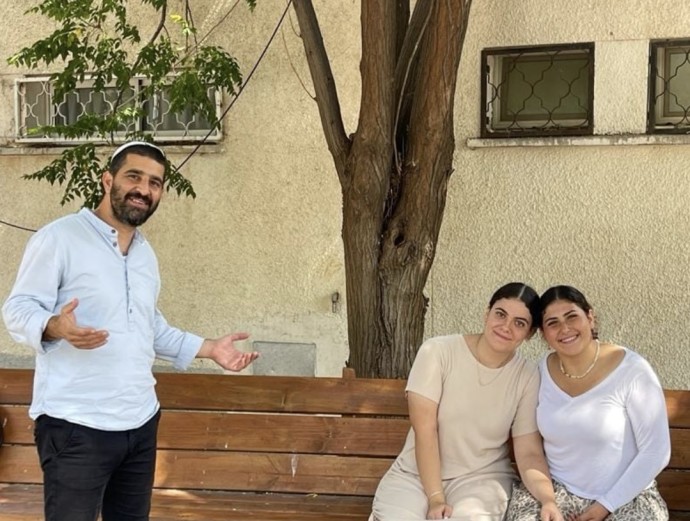Aviad Gabbai, 42, a Kiryat Malachi resident, returned to AMIT Kiryat Malachi, where he once studied and has served as principal for the past two years. “At the beginning, I felt strange,” he says. “But I came with a mission to show each boy and girl that from the desk they are sitting at as students, they can go far, all the way to the principal’s office and beyond.”
Nurit Davidi graduated from the AMIT Dyckman Ulpana in Be’er Sheva 30 years ago, and after working as a teacher in her hometown of Sderot (Nurit is the wife of Sderot’s mayor, Alon Davidi) and the Director of Informal Education at the AMIT Network, she decided to return to the school – this time as the principal.
Boaz Yosefi, 43, was born in Hatzor HaGlilit and is one of the prominent figures in the town, serving as principal of the local AMIT high school. Many of the residents are friends, neighbors, graduates, students and parents of students. “I have to take an additional fifteen minutes into account when planning my shopping, because I meet many parents and graduates and we need to catch up,” he says with a smile.
“Excellent principals are the key to building excellent schools"
All three principals returned to their classrooms and revolutionized the system, boosting educational achievements and opening new channels to success for their students who do not have access to state-of-the-art opportunities like their peers from Herzliya and Ramat Hasharon.
Education in Kiryat Malachi – an interview with Aviad Gabbai
This year, the number of students eligible for a matriculation certificate at the AMIT High School in Kiryat Malachi reached an eight-year high. An impressive 95% of students in the most recent graduating class were eligible for a matriculation certificate, representing an increase of thirty percent compared to the previous year. At the same time, there was a significant increase in the number of students completing advanced 5-point matriculation exams in English and mathematics.
An increase of 30% is very significant – how did you do it?
“I believe that the reason behind this is the personal relationships that developed between the teachers and students, which encouraged each student to strengthen their self-esteem. The homeroom teachers put in a great deal of effort, and we have special programs for helping students after regular school hours. The secret is in what we convey to the students – the desire to succeed, to have faith in their abilities, and the commitment to help anyone who is prepared to try “to climb Mt. Everest.” In addition, our school has invested in its physical space, and when our students study in a new building that looks like a hi-tech company headquarters, it shows them that the sky is the limit. “

How important is it for a principal to have once sat in the classroom where he is now teaching?
“I live and breathe this city and its residents. I did not come from the outside, and that strengthens my message, as well as that of all the teachers, that we are all one big family. Each student is an entire world and not just another name or number. That makes all the difference. Kiryat Malachi is raising a new generation that understands that they are responsible for their future. We are doing everything we can to help them with skills, knowledge, values, and a strong sense of self-worth. The jump in eligibility rates for matriculation, the fact that more students are taking five-point exams in mathematics and the significant improvement in English shows that we are on the right track.”
The Physicists from Be’er Sheva – an interview with Nurit Davidi
When Nurit Davidi arrived as principal at AMIT Dyckman, the school already had a strong tradition of excellence. This past year, 94% of the students graduated with a matriculation certificate. Nurit’s focus is on raising pedagogic quality and educational innovativeness. AMIT Dyckman was recently chosen as one of the outstanding schools in Israel, and its teachers receive the highest possible compensation.
One of the flagships of the school is its scientific and technological study track. For years, a significant gap existed between boys and girls in the percentage of those studying scientific subjects. Girls avoided advanced physics, and the gap in the religious schools was even greater. In Nurit’s school, there wasn’t even a physics track until six years ago. After a significant process and personal mentorship program, a physics major was established, and today, 25% of the girls study physics and graduate with a full five points in advanced physics, many with distinction.
How has the high school changed from when you were a student?
“AMIT Dyckman was, and still is, a warm and loving family. One of my first memories as a student is how the 12th-graders treated me like their younger sister and took me under their wing. The principal helped me cover the financial expenses of a school trip to Poland, offering me a summer job at the school while I was a student.”
“I live and breathe this city and it’s residents… we are all one big family"
When Nurit accepted the offer to return as principal, she felt a sense of closure. “I suddenly saw all sorts of things that I experienced as a student, but now from the principal’s seat. I was looking for many younger ‘Nurits’ like me. I found them. But my dream was that they would be better than me. I have done well, but I wanted them to be the best. As a student, I knew that my high school years were key to my success in life. The school did not give up on me and did not give in to me. This is the way I treat my students. We raise them to live a life of Torah values and excellence.”
Dreams in Hatzor – an interview with Boaz Yosefi
The approach at AMIT Hatzor is clear. The students completed the past school year with 97% obtaining matriculation certificates. Only six years ago, the eligibility rate was 69%! The school accepts a wide range of students and has seen a rise in the percentage of outstanding grades and the number of students in the five-point advanced tracks in English and mathematics.
“We have a dream team here,” says principal Yosefi. “The teacher’s room at the high school is not a regular room. We have teachers who regard their work as a true mission. There are teachers who donated a kidney to someone they did not know out of pure altruism. We have teachers who take in foster children. When learning from educational figures such as these, our students are motivated to put forth their best effort.”

The students follow the examples set by the teachers. The weekly curriculum at AMIT Hatzor includes regular hours of volunteering for each grade level. Tenth graders take a course in medical clowning and volunteer as medical clowns at hospitals and old age homes. Eleventh and twelfth graders volunteer throughout the year with mentally challenged youth. Each student receives a social matriculation certificate for developing social leadership skills.
What brought you back to the school as the principal?
“When I studied here, some students did not know how to dream. They were thinking small. I define my title as a dream builder. I want all my students here in Hatzor to dream big. The main motto of our school is to reach as high as possible and not give in to ourselves. If you want it, you can do it! To be a physicist or mathematician, a CEO or entrepreneur, a hi-tech expert or IDF officer - they can do it all.”
Is eligibility for a matriculation certificate relevant today? Don’t hi-tech companies, for example, look at skills and not at grades?
Aviad Gabbai both agrees and disagrees. “A matriculation certificate is important, but it is much more important to prepare the students for the future, so we included innovative programs in the curriculum that are relevant for the future and teach critical 21st century skills. AMIT runs special programs that are held outside of the school building, such as the medical ecosystem program, under the Louzoun Educational Ecosystem Program, where students in the electronics track work at Beilinson and Hadassah Hospitals on bio-technological developments under the supervision of doctors and engineers. Our students are developing a special sensor that will help nurses quantify and regulate medical pumps connected to patients.”
Nurit Davidi agrees that a matriculation certificate is not the ultimate objective but emphasizes the importance of personal connections and seeing the student as a whole. “Our most significant job is the mental work in strengthening our students,” she said. “This means empowering their dreams and giving them higher goals. I believe that our main task today is to see each student holistically, to strengthen our personal connections, and accompany them in a process of personal growth.”
Boaz still believes that students have to overcome the matriculation hurdle. “This is a starting point, after which one can continue to higher education and successfully integrate into the labor market,” he said. He also agrees that the matriculation certificate has lost the status it used to have. “Even so, it is still the basis. The parents demand it, and in most cases, students who travel around the world without a matriculation certificate will find many doors closed to them, and they will not be able to develop and advance their professional skills. One must not stop at matriculation but exceed it. Even so, we still have options for direct tracks to the world of innovation, such as a robotics group. Our junior high won a special prize this year in a national FIRST LEGO League (FLL) competition in robotics. Exposure to professionals in hi-tech and developing the students’ creativity are vital for their continued success as students and later, as adults.”
Dr. Amnon Eldar, Director General of the AMIT Network, says that excellent principals are the key to building an excellent school. “The fact that our students are returning as adults is wonderful, and I believe it gives every student the best personal example possible. There is a sense of closure and of success that empowers and enables even greater success. This is especially important in the periphery because our goal is to enable every student throughout Israel to break the glass ceiling and fulfill their dreams.”
